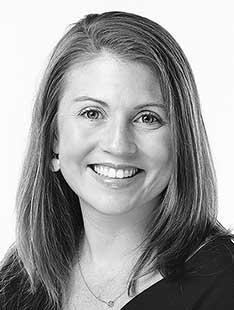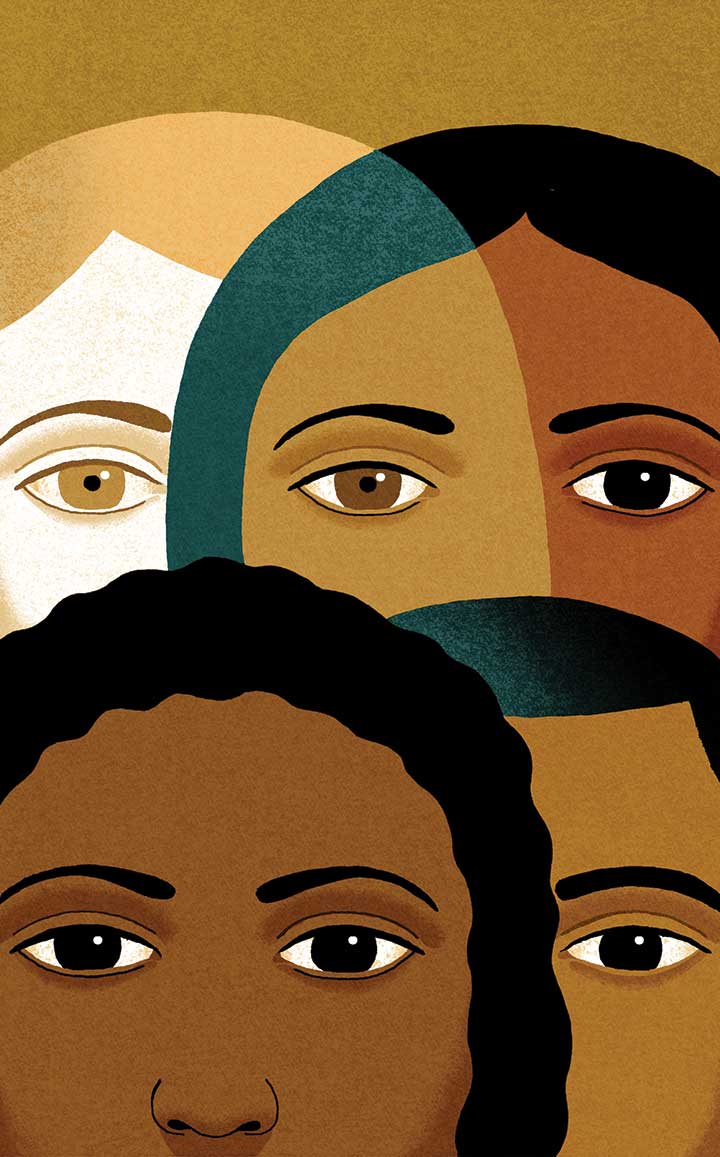What I Learned: How Diversity Benefits Privileged People Like Me

Amy Julia Becker ’98 is the author of White Picket Fences: Turning Toward Love in a World Divided by Privilege.
When I entered Princeton in the mid-1990s, I embodied the stereotypical student. I was eager and earnest and studious. I was also white, I had attended a private boarding school, my parents were married, and I came to Old Nassau with generations of family members who had graduated from Ivy League institutions before me.
At the beginning of sophomore year, I took an African American literature class on a bit of a whim. I had loved Toni Morrison’s Beloved in high school, so I selected a class where I could read it again. Gina Dent’s 10 a.m. lectures quickly became my favorite time of the week. The class combined something very familiar — discussing the intricacies and arguments of a literary text — with something foreign to me — the experience of black life in America.
It was in that class that I learned words like “liminal” and “hegemony.” I thought about what it meant to exist between two cultures, and I began to consider the norms of whiteness as a social force pervading my life and the lives around me. I started to notice the way black characters were almost always used as props or stereotypical tropes in movies, whereas white characters were more often fully realized human beings. I began to wonder about the triumphant narrative of American progress as I came to understand what had not been accomplished through the civil-rights movement. I learned about the still-yawning income gap between white and black Americans and the studies that continued to demonstrate bias in hiring and education.
In that class I encountered students who were like me in their love for literature and learning, but who were unlike me in their cultural backgrounds. My African American peers at Princeton hadn’t attended boarding school or grown up in Greenwich, Conn. They hadn’t attended Reunions with their grandparents. Their life experiences were different from mine, and hearing them talk about their fear when pulled over by the police; hearing their perspectives on the O.J. Simpson trial, which was in the news at that time; hearing them express how much their own social context resonated with the characters in the novels we were reading, expanded my view of the world. I ended up earning a certificate in African American studies, and those classes upended the simple narrative I had been taught and had told myself about my hometown, my childhood, and my history as a white American.
Even ordinary interactions became more complicated, more uncomfortable. I remember, for instance, hearing a mildly racist remark while sitting at dinner in an eating club one night. I felt caught between the social cost of speaking up and the personal cost — the sense of betrayal to my classmates — if I didn’t say anything. I stayed silent, and the moment haunted me. My view of the world had shifted through those classes, but my place in the world remained the same. Most of my closest friends were white and highly educated, and that didn’t change after graduation.
I soon married, and a few years after that, we had a baby girl. In a different way this time, I came face to face with my own prejudice and my own homogeneous experience of the world. Our daughter Penny was diagnosed with Down syndrome a few hours after she was born. Having an intellectual disability is not the same as being a person of color, of course, but just as my African American studies classes at Princeton had introduced me to life outside of the social context of whiteness, so too a daughter with Down syndrome thrust me into a new social and emotional experience that challenged my perspective. I had always been praised and rewarded for my intellect, which led me to assume that people with similar strengths had greater value in our meritocratic society. But I quickly recognized Penny as a gift in her own right, and I began to reconsider the way I had assigned value and the ways I had unintentionally cut myself off from beauty, growth, and wonder by relating only to people like me.
Penny is 13 now. She has inherited my need for order, my conscientiousness, my love for reading. But she has also offered me her own gifts and taught me through the ways she is different from me: her perseverance, her willingness to laugh at herself, her constant inclination to encourage other people. Penny has helped me to understand that human life is valuable not because of intellectual prowess or physical strength or social status, but because every human being is both needy and gifted, every human being can give to and receive from others, every human being is capable of loving and being loved.
In the early years of Penny’s life, I wanted to use my position of privilege to advocate for people with intellectual disabilities, for people “in need.” Then I started to understand my own needs, including the need I had for people from different backgrounds and with different abilities than my own. Still, it wasn’t obvious to me how I might forge friendships outside of my natural social bubble in a small, highly educated, predominantly white town in western Connecticut.
And then one night, after we had read a chapter of Charlie and the Chocolate Factory, I sat in our kids’ room and scanned the bookshelf. I was surprised, and dismayed, to notice that all the chapter books on our shelves involved white characters. When I went to the library to look for a more expansive list of books, I instead discovered a history of underrepresentation of people of color within children’s literature as a whole. I also discovered books that tackled some of the violence and injustice toward African Americans, but I felt myself shying away from exposing our children to those realities.
I reached out to an online colleague — an African American writer named Patricia — and asked her when she had exposed her children to the brutality of American history when it came to race. She wrote back: “I didn’t get a pass on knowing about evil. Nor did my children. In fact, I never imagined that some parents even have a choice whether to talk about it.” It took me a while to agree that I had a responsibility to educate my young children about the history of horror and ongoing acts of injustice in our nation, but eventually these conversations with Patricia changed me and changed the way we talk about race, politics, and social events with our kids. I now count Patricia as a gracious mentor and an honest friend. Not only has our relationship changed our kids’ bookshelf, it has led me to be more intentional in my small spheres of influence — at church, school, and work — to speak about the problems of whiteness with white audiences, and to invite people of color to take up leadership positions for which they were overlooked before. These are small steps.
In recent years, Princeton has dramatically increased the socioeconomic, racial, and ethnic diversity of the student body. This change is good in an obvious way — capable and qualified students from across the nation and across income brackets can benefit from the education and opportunities offered by admission. But my experience as a student and as a mother makes me think that the benefits will extend to the students from the top socioeconomic bracket as well.
For me, seeking out diverse relationships meant welcoming discomfort and discord. It meant embarking on an uneasy and ongoing journey to confront simplistic narratives, to confront prejudice, to confront privilege. It also meant growth as I encountered the common humanity of others, recognized my need for people who have different gifts and experiences than my own, and explored ways to give of myself.
I am hopeful that the expansion of diversity within the student body at Princeton will do more than offer opportunities to a group of “underprivileged” young women and men. I hope it will also offer opportunities to the “overprivileged” young women and men who come from backgrounds like mine. I hope it will challenge assumptions and values and norms. I hope it will disrupt social life and prompt uncomfortable conversations and ultimately lead to friendships that cross the barriers of race and religion and social class. I hope it will lead to changes within the households, spheres of influence, and institutions in which graduates go on to live, serve, and work.
A place where we will not be content to stay comfortable with people who look and think and talk the way we do is better for us all.










No responses yet